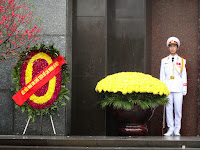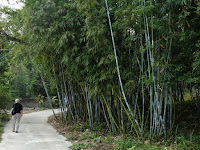Ha Noi, Thailand
 |
| Foggy Morning in Vietnam |
I don't like bus rides because the seats
are not made for my tall body. Three+ hours is literally a bit of a torture, my
legs don't fit and the headrest presses into my neck instead of supporting my
head. But I mentioned this once before already, it is just that I need to vent
I think, I hate bus rides. Especially in buses made for smaller Asian people.
On the way to Ha Noi we passed many open pit coal mines. The pollution from the mines, in the villages we passed, is
clearly visible. Coal is exported to China but most of it is used domestically
as the power source for electricity generating plants. The first nuclear powered
electric plant is being built now to be on line in about 2 years. So far Vietnam
has no idea where they will store the spent fuel rods, the politburo is still “thinking”
about the
right location for this radioactive trash.
 |
| Coal Ready for Transportation |
China ruled Vietnam for over 1000 years and
left quite a few beliefs and ways of living before they were finally driven out
of Vietnam. One of these ways was the education system. The Chinese had a
school system based on Confucianism. A boy at the age of 6 was given a test to
see how smart he was. This test was given, once a year, to every child in the
nation. Only the very, very best were chosen and then educated free of charge
by the best teachers in the Empire. Those boys were trained to become future Doctors,
Ministers or Politicians. Naturally every family wanted their son to be one of
the smart ones. The family went to a temple to pray before the actual exams to
make sure the gods would help
their son. The tests were very difficult and only
with help from the gods, could they be passed.
 |
| Temple of Van Mieu-Quoc Tu Gian |
 |
| Entering the Complex |
 |
| Amazing Banyan Tree |
 |
| 500 Year Old Stone Turtles in Front of Stele Listing Names of Previous Scholars |
Donations to the temple are cheerily
accepted. The collection box was full of bank notes.
 |
| Picture of the Original "Hanoi Hilton" (Hoa Lo Prison) |
“The Hanoi Hilton “is not a hotel; quite the
opposite. This place is a reminder of the brutality humans are capable of. One
would think people would learn from history but after visiting here I can
assure you nothing has been learned.
Brutally mistreating prison inmates, no matter the race, belief or outlook on life, is deplorable. But you know all of this; you see the latest ISIS brutalities almost daily on TV or on the Internet. Well, the Hanoi Hilton, originally
built by the French to mistreat Vietnam’s
political prisoners, is just one example of many places in the world. A sad
place! It is a museum today, set up to show some of the horrors that happened
here. Giving the premises a museum look, cleaning it up, categorizing actions,
only showing what the administration deems appropriate, is censorship. The Hanoi
Hilton has been severely censored. Three quarters of the facility was ripped
down and a skyscraper apartment building erected in its place.
The left over
part is now just a museum, a money maker focused on the mistreatments of Vietnamese
people by the French. There is hardly a mention of the real conditions American
Pilots faced when they were incarcerated here during the last war.
 |
| Prisoners Locked in Place |
Brutally mistreating prison inmates, no matter the race, belief or outlook on life, is deplorable. But you know all of this; you see the latest ISIS brutalities almost daily on TV or on the Internet. Well, the Hanoi Hilton, originally
 |
| Carving Showing Prison Brutality |
 |
| Cell Door in the Dungeon Area |
 |
| Ba Dinh Square with Ho Chi Minh's Mausoleum |
After a good lunch at the Wild Lotus Restaurant, we entered what seemed like a protected, almost holy section of Ha Noi, the political compound. The Ba Dinh Square; where streets were blocked off, and uniformed guards were controlling people's movements.
 |
| Ho Chi Minh's Mausoleum |
Many sections were not to be visited, were verboten. The center of this whole area was Ho Chi Minh’s (HCM) mausoleum. A utilitarian looking building, like
 |
| Communist Flags |
 |
| One of the Honour Guards at the Mausoleum |
Honor guards in white uniforms stood on top of the stairs, next to the entrance. Another few uniformed guards with all kinds of medals pinned to their chests loitered about looking bored.
 |
| Bored Looking Guard |
Right across from the mausoleum is the building
that houses the 500 members of the Politburo's Congress who run Vietnam today. But
due to a lot of infighting and political positioning among themselves, there is
no time to work on the real issues of the land. Every member just shows up and
does nothing. Everybody is afraid to stand up and address problems or upset the
corrupt apple cart, because if one does, one gets killed. A bit of poison is
known to do the best job. The locals call this building the “Puppet Theater”.
Behind the mausoleum, I visited the house
HCM lived in while alive. First there is a rather fine house the nation wanted
him to live in, like the U.S. president lives in the White House. This house, the
Yellow House, was a bit too grand for HCM. He built a very simple, one bedroom cottage-like house nearby and worked from there. I saw this simple affair of a
house and liked it better, too. The large house is now the Presidential Palace
although the President is a mere figure-head who
functions only to give out
medals or show him-self at functions or to give speeches at schools. He is an
empty suit.
 |
| The "Yellow House" Where Ho Chi Minh Refused to Live and Now is the Presidential Palace |
The real power sits across the street from
his Palace at the headquarters of the Communist Party. That is where the
decisions are made after the members’ political positions are somewhat secured.
Vietnam is run by a few rich people who make the majority of the people pay
taxes and with a lot of ridiculous laws, keep the masses under control and
poor. If you are within the circle of the politburo you live well. Even the
extended family members of each member of the politburo live well. This area we visited,
the area around HCM’s grave, gives one a visual representation of the power brokers
behind today's Vietnam. A bit scary to walk through this bit of Ha Noi, it
reminds me of the times I walked through East Berlin before the wall came down.
A nice spot, and a surprise, was the one pillar pagoda. A smart looking, small building that serves as a temple. The
architectural idea behind the building intrigued me. Clever!
We had to drive back to the ship anchored
at Ha Long Bay so we left Ha Noi around 3 pm. Vietnam was celebrating the
beginning of Tet. This day is like New Year's Eve in the West; here it is
called “Tet”; The Chinese New Year. Tet is an official 4 day festival but
people take off 10 days to allow for travel on the other 6 days. Everybody goes
back to their place of birth, to their family.
It is the festival where the
ancestors are honored. There is a ritual for each day. New Year's Eve, the day
before day 1 of Tet is all about eating, drinking and being festive. Day 1 is the family reunion day. Day 2 is the family parents’ day where
one’s parents and grand parents are visited and honored. Day 3 is dedicated to
the parents-in-law or the extended family. Day 4 belongs to teachers or close friends.
Gifts are exchanged, food is eaten, and visits are made. It is a hectic and happy
time with lots of music, drinking and food.
 |
| Brilliant Lights to Guide Us Back to Our Ship |
 |
| Colours of the Lights Are Constantly Changing |
We thought it a good idea to be on the ship
before the real drinking and driving starts. The rice wine consumed is 49 %
alcohol. Already on the way back we heard very loud, booming “Rap” music; if
one can call that noise music, but it sure was loud. It was audible from blocks
away. There will be no sleep for the villagers tonight; the music will awake
the dead. Happy (Chinese) New Year!




















